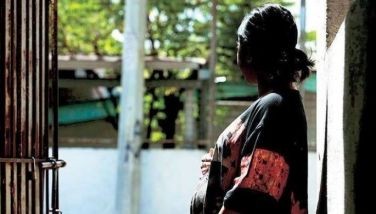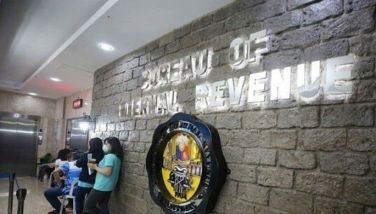DOJ junks tax evasion raps against former agriculture chief
October 13, 2005 | 12:00am
The Department of Justice dismissed yesterday the tax evasion complaint filed by the Bureau of Internal Revenue against former agriculture secretary Arthur Yap and his father, Domingo, for "insufficient evidence."
The tax evasion complaint against the Yaps stemmed from their alleged failure to pay correct documentary stamp taxes, to file the withholding tax return and pay the correct creditable withholding taxes involving property that their company bought in 1997.
In an 11-page resolution, State Prosecutor Sebastian Caponong Jr. said the DOJ did not find any reason to go into the merits of the BIR’s classification of the subject property as an ordinary asset, subject to the filing of a creditable withholding tax return and the payment of the creditable withholding tax.
"Suffice it to say that since the characterization of the subject property has been contested by respondents, a prior determination of the kind of tax due should first be made by the proper office before respondents can be held liable for tax evasion. Otherwise, a charge of tax evasion would only be premature," Caponong said.
Last June 16, the BIR filed tax evasion complaint against the Yaps for violation of the National Internal Revenue Code.
The BIR claimed that Domingo and Arthur, president and vice president of DHY Realty and Development Inc., respectively, bought in January 1997 a parcel of land measuring 3,176 square meters located at the corner of Caruncho Avenue and San Agustine street in Pasig City.
According to the BIR, the transaction was covered by a conditional deed of sale executed by Nestor Mendoza, in his capacity as attorney-in-fact for the registered owner, Carlota Velasco Mendoza, and Domingo Yap in his capacity as president of DHY Realty.
The BIR said the sale amounted to P20.6 million, 30 percent of which was received and acknowledged by the seller as down payment. It was agreed that 20 percent of the purchase price would be paid within 60 days, with the outstanding balance of P10.3 million to be paid in four equal installments of P2.5 million. The buyer would also defray the expenses for capital gains tax, documentary stamp tax and other taxes.
However, despite the conditional deed of sale, Carlota Mendoza and DHY Realty subsequently entered into and executed a deed of absolute sale dated January 1997 covering the same parcel of land for only P12.7 million.
In November 1997, another deed of absolute sale involving the same property was executed by the Mendozas and Arthur Yap. This time, the amount of the transaction was P14.2 million.
Investigation conducted by the BIR showed that a third deed of absolute sale covering the same property was executed by the Mendozas and Arthur Yap, this time supposedly notarized on Sept. 17, 1998 for the amount of only P1 million.
According to BIR, DHY Realty should have paid P3.07 million for creditable withholding tax and P923,818.90 for documentary stamp tax, or a total of P4.03 million.
Yap argued that it is the responsibility of the seller of the property to pay the documentary stamp tax, emphasizing that he supports the government’s campaign against tax evaders.
He also claimed he was used as a scapegoat to divert the attention of the public from the serious controversies hounding the Arroyo administration and her family members at the time of the filing of the tax evasion case.
Yap said they entrusted DHY Realty’s external counsel, lawyer Karlo Butiong, to take all the necessary steps to register the transaction, pay the appropriate taxes and have the property transferred to the company.
He said they did not know that Butiong, without any authority from them or the DHY Realty, presented a falsified deed of sale, underpaid the documentary stamp tax due and did not pay the appropriate tax due.
"Butiong’s act cannot properly serve as the basis to hold us responsible for tax evasion," Yap said.
In his decision to dismiss the case, Caponong gave credence to the argument of the Yaps that the National Internal Revenue Code penalizes not the mere intent to evade the payment of proper taxes, but the actual attempt and willful failure to file the return and pay the taxes due.
"In the instant case, the BIR failed to establish that respondents were parties to an actual attempt and willful failure to file the return and pay taxes in violation of the law. While the BIR fully deserves credit in its continuing efforts to improve tax collection and prosecute tax evaders and should be properly commended therefore, we cannot countenance the filing of tax evasion charges in court without sufficient and tangible proof of criminal involvement. We find credence in the respondents’ contention that the subsequent deeds of sale were the result of the parties’ continuing negotiations on the purchase price of the subject property," Caponong said.
The tax evasion complaint against the Yaps stemmed from their alleged failure to pay correct documentary stamp taxes, to file the withholding tax return and pay the correct creditable withholding taxes involving property that their company bought in 1997.
In an 11-page resolution, State Prosecutor Sebastian Caponong Jr. said the DOJ did not find any reason to go into the merits of the BIR’s classification of the subject property as an ordinary asset, subject to the filing of a creditable withholding tax return and the payment of the creditable withholding tax.
"Suffice it to say that since the characterization of the subject property has been contested by respondents, a prior determination of the kind of tax due should first be made by the proper office before respondents can be held liable for tax evasion. Otherwise, a charge of tax evasion would only be premature," Caponong said.
Last June 16, the BIR filed tax evasion complaint against the Yaps for violation of the National Internal Revenue Code.
The BIR claimed that Domingo and Arthur, president and vice president of DHY Realty and Development Inc., respectively, bought in January 1997 a parcel of land measuring 3,176 square meters located at the corner of Caruncho Avenue and San Agustine street in Pasig City.
According to the BIR, the transaction was covered by a conditional deed of sale executed by Nestor Mendoza, in his capacity as attorney-in-fact for the registered owner, Carlota Velasco Mendoza, and Domingo Yap in his capacity as president of DHY Realty.
The BIR said the sale amounted to P20.6 million, 30 percent of which was received and acknowledged by the seller as down payment. It was agreed that 20 percent of the purchase price would be paid within 60 days, with the outstanding balance of P10.3 million to be paid in four equal installments of P2.5 million. The buyer would also defray the expenses for capital gains tax, documentary stamp tax and other taxes.
However, despite the conditional deed of sale, Carlota Mendoza and DHY Realty subsequently entered into and executed a deed of absolute sale dated January 1997 covering the same parcel of land for only P12.7 million.
In November 1997, another deed of absolute sale involving the same property was executed by the Mendozas and Arthur Yap. This time, the amount of the transaction was P14.2 million.
Investigation conducted by the BIR showed that a third deed of absolute sale covering the same property was executed by the Mendozas and Arthur Yap, this time supposedly notarized on Sept. 17, 1998 for the amount of only P1 million.
According to BIR, DHY Realty should have paid P3.07 million for creditable withholding tax and P923,818.90 for documentary stamp tax, or a total of P4.03 million.
Yap argued that it is the responsibility of the seller of the property to pay the documentary stamp tax, emphasizing that he supports the government’s campaign against tax evaders.
He also claimed he was used as a scapegoat to divert the attention of the public from the serious controversies hounding the Arroyo administration and her family members at the time of the filing of the tax evasion case.
Yap said they entrusted DHY Realty’s external counsel, lawyer Karlo Butiong, to take all the necessary steps to register the transaction, pay the appropriate taxes and have the property transferred to the company.
He said they did not know that Butiong, without any authority from them or the DHY Realty, presented a falsified deed of sale, underpaid the documentary stamp tax due and did not pay the appropriate tax due.
"Butiong’s act cannot properly serve as the basis to hold us responsible for tax evasion," Yap said.
In his decision to dismiss the case, Caponong gave credence to the argument of the Yaps that the National Internal Revenue Code penalizes not the mere intent to evade the payment of proper taxes, but the actual attempt and willful failure to file the return and pay the taxes due.
"In the instant case, the BIR failed to establish that respondents were parties to an actual attempt and willful failure to file the return and pay taxes in violation of the law. While the BIR fully deserves credit in its continuing efforts to improve tax collection and prosecute tax evaders and should be properly commended therefore, we cannot countenance the filing of tax evasion charges in court without sufficient and tangible proof of criminal involvement. We find credence in the respondents’ contention that the subsequent deeds of sale were the result of the parties’ continuing negotiations on the purchase price of the subject property," Caponong said.
BrandSpace Articles
<
>
- Latest
- Trending
Trending
Latest
Trending
Latest
Recommended
January 17, 2025 - 12:00am




























